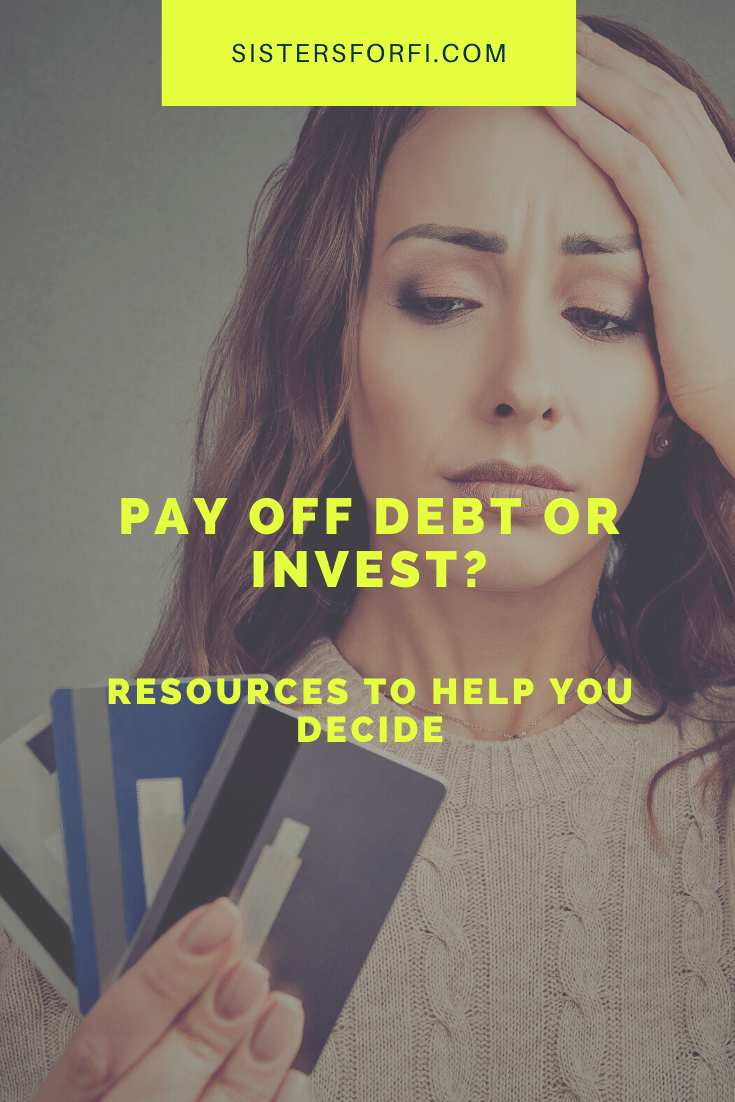Should You Pay Off Debt or Invest? Resources to help you decide.
A big question that often comes up is should I be investing even if I have debt?
I recently shared on Instagram my personal decision to invest despite having student loan debt and credit card debt early on. I'm re-sharing it here. We all have different tolerance for risk, but a little number crunching will show that paying off debt AND investing will be more beneficial for you in the long run.
Pay Off Debt or Invest? Resources to help you decide.
Observations:
If I had waited until I had paid off all of my debt, I may never have started investing.
At the beginning, contributions and returns were low and slow due to many reasons: lack of money, lack of knowledge and little time in the market.
But look at what consistency does, it pays off and will continue to pay off.
Today, I'm sharing with your some tools to help you decide for yourself.
There are two sets of information that are needed to use these calculators. The terms of your loan and the terms of your investments. Loan terms are pretty static so this is easy to enter. For entering investment rates of return, go with a conservative number. These tools are fairly simple and it doesn't take into account tax deductions or employer sponsored retirement accounts that can earn you more money.
Compound Interest Works Both Ways
Compound interest has been deemed the 8th Wonder of the World and it absolutely is, but we have to keep in mind that compound interest can also work against you especially when it comes to debt. If left alone, debt interest can continue to accumulate and can make it harder to pay it down. Paying interest on interest is definitely not a recommend path for growing wealth and achieving financial security.
Student Loan Payoff vs. Investing in Retirement
This is a terrific tool for those just starting out. It allows you to enter your student loan info against your investment option. Investing for retirement early may not be the top thing to do when you are young, but doing so early on can pay off big in the future.
Investing small amounts early builds a habit of consistency. Putting that money aside means learning to live on less which ensures you always have a gap between spending and saving.
When it comes to consolidating your federal student loans, I will caution you with doing so as it can cause you to lose certain borrower benefits. Yes, you'll get the ease of paying a single monthly payment, but it can increase the loan terms and the interest that you will pay.
Mortgage Payoff vs. Investing
Currently, mortgage rates have been at an all-time low, but you may be thinking about sending extra money towards the principal. There are many reasons you may want to do this.
You want to own the home clean and clear
You want to reduce the interest that you are paying
You no longer want the burden of a mortgage eating up your monthly expenses
These are all good reasons so I recommend using this tool (downloadable Excel) to compare what would happen if you pay off your debt or put that money towards an investment account. The math will point out that in the long-run, investing will provide a bit more flexibility for you down the line. Of course, since we are all humans, our need for financial security will vary in different ways.
Credit Cards Debt vs. Investing
Credit cards typically have higher interest rates than student loans or mortgages so the recommendation is to pay these off as quickly as you can. Review your credit card terms. You can call your credit card company to negotiate a new APR or maybe new payment due dates so that you have more flexibility. Make this an action item for you to do this month. Even getting a 1% reduction in APR can save you money. In addition, see what's possible with balance transfers. These can be a good way to pay down debt and save money on interest down the line.
Earning the Difference
Lastly, earning more can help you pay down down and invest that much faster. When it comes to earning more, your first priority should be your place of employment. Negotiate for those salaries or other perks to increase your compensation.
Don't dismiss other ways to earn money too. You don't need a formal side hustle or business to do this. Earning an extra $100 dollar every other month can go along way when that money is invested or used to pay down debt. Many times people dismiss small amounts, but they really do have a way of adding up.
Should You Pay Off Debt or Invest? Resources to help you decide.









